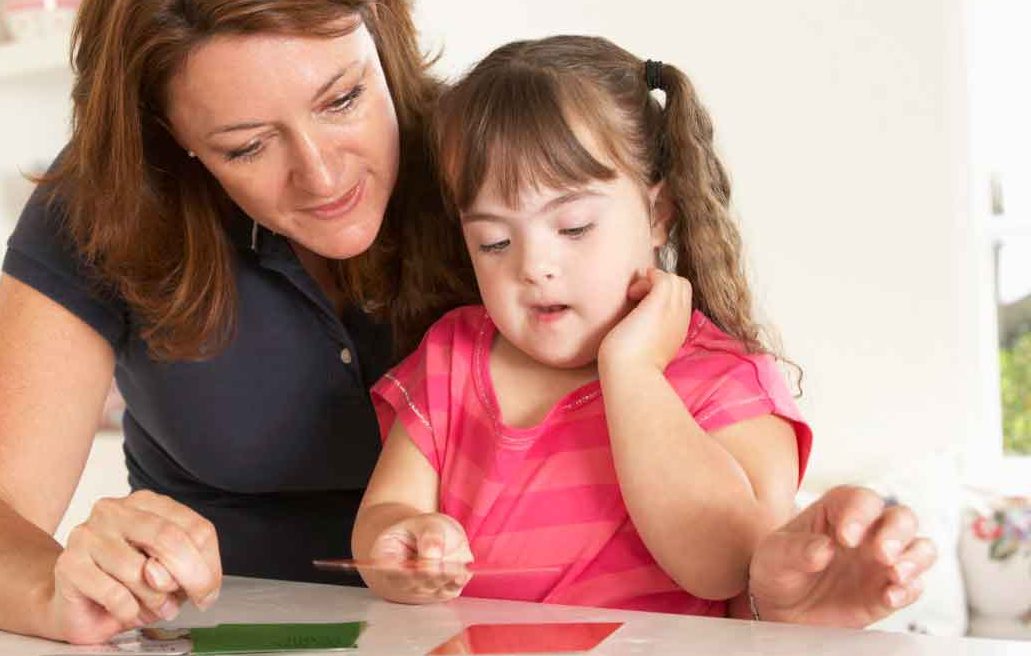Caring for a Child with Intellectual Disability

If your child has an intellectual disability, check out these services that can help you care for your child and give you a break once in a while.
At first your baby was slow to sit up and crawl. It took her longer to walk or talk. Maybe the doubts came when it was time to potty train, or your child fell behind her peers at skills like getting dressed and handling cups and spoons.
YOU MIGHT ALSO LIKE: Caregivers for a Child with Leukemia
It’s easy to panic. Once you get her tested and learn why she’s falling behind, the news can be overwhelming: You’re a parent of a special-needs kid.
Realize that, like every child, she has a lifetime to learn and grow. You’ll be giving her chores and feedback, getting her involved in social activities, talking to her teachers and other parents, and delight in her. By the age of 16, if not sooner, you can begin planning how she’ll live on her own, if that’s possible. You have plenty in common with all parents.
Ditch the stigma
Don’t think of your child as “retarded” or let anyone call her a “retard.” The term “mental retardation” is now “intellectual disability” (ID) in the nation’s special education law. The definition itself remained the same. An intellectually disabled child has below average intelligence alongside slowness developing life skills and learning in school. “Below average” might be below 70 to 75 on an IQ test; 100 is average.
If family or friends have zero expectations for your child, explain that children with ID do learn, with enough time and effort.
Get a diagnosis early
If you’re concerned about a child under the age of three, ask your child’s pediatrician for a referral, or call the maternity ward at a local hospital to find out where you can have her evaluated.
Possible causes for ID include abnormal genes, a rubella infection or the mother having used alcohol during pregnancy, or a birth problem that cut off the infant’s oxygen supply. After birth, whooping cough, measles, meningitis, extreme malnutrition, and exposure to lead or mercury can damage a child’s brain.
Besides having an IQ test, your child will need to be evaluated in comparison with other children of a similar age. The tests will look at your child’s ability to get dressed, go to the bathroom, and eat on his or her own. Your child’s communication and social skills will also be measured.
You may dislike labeling your child and put off tests. Being labeled with ID, however, makes her eligible for free special education beginning at the age of three. Getting early help could make a big difference. The diagnosis also makes her eligible for other community services, Social Security benefits, and special treatment in the criminal justice system.
ID kids need discipline, too
Maintain your sanity and get her on the right track. Research suggests that bad behavior, rather than the actual disability, stresses parents of ID children the most.
Depending on their condition, ID kids are more likely to act out and have other mental health problems, and they’ll need more guidance in knowing how to behave in public.
Learn strategies such as:
- Keeping charts
- Having a reward program
- Ignoring bad behavior
- Letting your child experience bad consequences
- Holding time outs
Be consistent. Your child will test your limits because that’s what kids do. Don’t give up on her. Let her know that your standards are important and that you believe she can live up to them. Learning to regulate her emotions and cooperate is part of life. After all, she may hold a job one day.
Tackle your daily exhaustion
Raising a child with special needs takes energy. Decide what you can ignore on your to-do list. Cutting corners is fine if it gives you some rest or time with your spouse and other children.
Get connected and get help
Be sure to investigate local chapters of The Arc (800-433-5255), an organization that provides a wide range of services to the intellectually disabled and their families.
At a minimum, delegate tasks to other reliable people. Mothers still do most of the childcare, but “it takes a village” applies to your child just like any other.
Get emotional help
Consider counselling, for yourself and your child. Some research shows that parents of ID kids can get sucked into their child’s depression[DE1] . Monitor your child’s emotional health and make sure you don’t slip into that pattern.
Take breaks
Around the country, you can find:
- Respite programs that bring a caregiver to your home for a few hours daily, weekly, or as needed
- Drop-off day programs
- Parent coops, in which parents take turns minding each other’s kids
Check listings at the ARCH National Respite Network or Easter Seals.
Breaks are essential to allow you to recharge frequently and keep up your own life in between, which will make you most effective over the long haul. Happy parents are better parents.
Updated:
October 23, 2023
Reviewed By:
Janet O’Dell, RN